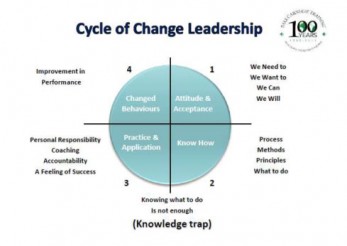Keeping employees motivated during challenging times
13 December 2012 By Northern Lights

 How do you keep your employees ‘engaged’ in difficult times? This was the theme of the talk by Juliet Dinette of Dale Carnegie.
How do you keep your employees ‘engaged’ in difficult times? This was the theme of the talk by Juliet Dinette of Dale Carnegie.
The first challenge we had as a group was ‘how do you define ‘engaged employees’?’ This was clearly a new concept to many around the table. The consensus was that engaged employees feel involved in the business, have a clear idea about where it is going and their role in that, there is strong teamwork and employees give that bit extra because they want to see success.
Why is this important and can you measure the impact of this? A Gallup Survey showed that
- 59% of engaged employees say that their job brings out their most creative ideas, against only 3% of disengaged employees
- 70% of engaged employees indicate they have a good understanding of how to meet client needs – as against just 17% of non-engaged employees saying this
- Engaged employees in the UK take an average of 2.69 sick days per year; the disengaged take 6.19 – and the CBI reports that sickness absence costs the UK economy £13.4bn a year
We discussed in small groups what the challenges were in our businesses and a general theme was around restructures. Most businesses have made cutbacks of some kind, those left are doing more work with fewer resources and it has created a climate of some uncertainty – even where firms are still doing well.
All this resonated with Juliet who went on to look at these issues.
1. Communication needs to be more specific
Change always creates uncertainty. And often the weak part is not to explain fully why changes have been made or how employees fit into the new world.
Often communications are good around the business itself, but fail to address individual concerns – such as ‘do I have a job on Monday?’.
2. Do you want to keep people?
When Juliet was talking about how engaged employees are more likely to stay, I did just raise a point.
A degree of churn can be good for a business. Yes, it is good to have stability in a workforce but I believe this needs balancing with a reasonable turnover of employees. Professions can become stale if you don’t get new blood in regularly to shake things up.
3. Leadership is the start and finish to it all
Juliet told a story about helping an (un-named) law firm with a major restructuring. The firm held a big event for 200 employees, cabaret style tables, big screen and the senior partner giving a razzmatazz presentation – all about how to attract new clients to the firm and new ways of doing things.
She was horrified to see the top team sitting at the front, together. No-one from the management team was at the door to greet employees, finding them a bacon sandwich, asking them about their challenges, listening to their ideas. This was both a missed opportunity – and the presentation lacked credibility because the management team failed to ‘walk the talk’.
4. Have we built trust?
Dale Carnegie built much of its reputation on the famous book ‘How to win friends and influence people’. The principles still stand decades later and particularly apply to leaders.
A leader should not condemn, criticise or complain. They lead the culture of the firm – everyone messes up at times, their role is to support and help employees learn from mistakes.
They also need to give honest, sincere appreciation. Create an eager want and enthusiasm; smile and be approachable (so missing in the presentation example above); remember and use names; be a good listener and talk in terms of the employees’ role.
She gave the example that leaders often say ‘I want you to….’ instead of using the more powerful ‘we’ and turning the sentence around so that it is looked at from the employee’s perspective.
5. Cycle of change leadership
Juliet talked us through how a cycle of change leadership works. The goal is to end up with the fourth sector, in the graphic below – that of improved performance.
To do that you have to change attitudes, know how – processes and methods; people need a clear direction and to be accountable for their part in the success and be recognised for that success. All resulting in better performance at the end.
This was a thought-provoking talk and my thanks to Juliet. It covered a lot of ground and, from the questions, is one that most businesses are thinking about at the moment.
I got a lot out of it – and particularly Juliet’s tips on how to remember names!
For her own name she said to imagine her on a balcony (Romeo and Juliet); looking down on a lot of people below making a din; and then leaning back to throw a net out over the crowd.
It’s an image that will stay with me forever I am sure – and more importantly the name too!


